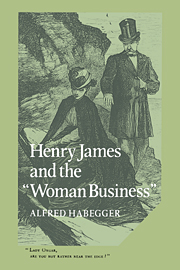Book contents
- Frontmatter
- Contents
- Acknowledgments
- Abbreviations
- 1 Introduction
- 2 The Lessons of the Father: Henry James, Sr., on Sexual Difference
- 3 Precocious Incest: First Novels by Louisa May Alcott and Henry James
- 4 The Chains of Literature: Elizabeth Stoddard and Henry James
- 5 Anne Moncure Crane Seemuller: Henry James's Jocasta
- 6 Minnie Temple's Death and the Birth of Henry James's Imagination
- 7 The Fatherless Heroine and the Filial Son: Deep Background for The Portrait of a Lady
- 8 The Return of the Father in The Bostonians
- 9 Conclusion
- Notes
- Works Cited
- Index
3 - Precocious Incest: First Novels by Louisa May Alcott and Henry James
Published online by Cambridge University Press: 04 November 2009
- Frontmatter
- Contents
- Acknowledgments
- Abbreviations
- 1 Introduction
- 2 The Lessons of the Father: Henry James, Sr., on Sexual Difference
- 3 Precocious Incest: First Novels by Louisa May Alcott and Henry James
- 4 The Chains of Literature: Elizabeth Stoddard and Henry James
- 5 Anne Moncure Crane Seemuller: Henry James's Jocasta
- 6 Minnie Temple's Death and the Birth of Henry James's Imagination
- 7 The Fatherless Heroine and the Filial Son: Deep Background for The Portrait of a Lady
- 8 The Return of the Father in The Bostonians
- 9 Conclusion
- Notes
- Works Cited
- Index
Summary
Half a century ago Pierre la Rose (p. xi) and Katharine Anthony drew attention to the paradox that young Henry James's review of Louisa May Alcott's first serious adult novel, Moods, scoffed at her use of the same heroine he himself would build so many novels around: “We are utterly weary of stories about precocious little girls. In the first place, they are in themselves disagreeable and unprofitable objects of study; and in the second, they are always the precursors of a not less unprofitable middle-aged lover” (Literary Criticism I: 189). It seemed odd to la Rose and Anthony that the man who wrote this surly dismissal would in time create a number of precocious girls of his own – Isabel Archer, Verena Tarrant, the governess at Bly, Maisie Farange, Nanda Brookenham. James's first novel would in fact introduce its heroine by twice calling her precocious (“Watch and Ward” 238, 241). Even stranger, as Anthony noticed, every one of these girls would fall in love with the older man James claimed to be so weary of. “The mutual influence” of James and Alcott “was perhaps stronger than anyone realizes” (180), Anthony guessed, correctly, even though “influence” in the old sense does not capture the rich network of connections between the two writers. The fuller truth, which this chapter will attempt to glimpse, is that Moods assisted young James in defining his response to a large group of novels by women, and thus made it possible for him to absorb their stories and character types in his own narratives.
- Type
- Chapter
- Information
- Henry James and the 'Woman Business' , pp. 63 - 84Publisher: Cambridge University PressPrint publication year: 1989
- 1
- Cited by



